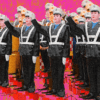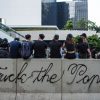Original: 【Say No to 警察?——另類的警政模式可能嗎?】, published in The Owl 夜貓媒體
Translators: P, Edward Hon-Sing Wing, Joy Ming King
If you would like to be involved in our translation work, please get in touch here.
Translators’ note: The author explores an alternative form of policing; one that is more democratically accountable and that does not require a professionalized police force to maintain public order. As abolitionists and anti-imperialists, we disagree that the police in Northern Ireland should be seen as a positive example of an alternative, especially given its role in reinforcing British colonialism in Ireland and continued violence against racialized and working-class communities, and believe in the need to challenge the very concept of “law and order” if we are to truly address state violence. Nevertheless, democratization of police management, as proposed by the author, may mitigate some of the problems associated with policing. “Say no to cops? Is another form of policing possible?” may serve as the seeds of an abolitionist politics in Hong Kong that questions entrenched logics about policing and the law.
Leftists often say ACAB (All Cops are Bastards). In response, many people will sardonically reply that this is too extreme, or that a society without a professional police force would become too chaotic. Is this really the case? Is it true that modern societies can only protect social order and remove violence through a professional police force? In this article, I will deconstruct this narrative by analyzing the term “police” and the history of modern police, and suggest an alternative model of policing.
The police have never been necessary; “the police” and “policing” are different things.
I once read a post on Facebook that argued that the police are a product of modern society, that for much of human history, there were no police and there were no problems. Make no mistake, the professional, full-time police are a product of modern society; but there have also been groups responsible for providing public order in many societies across the world before the development of the police. In rural areas, public order was usually the responsibility of a group of district watchmen organized by the gentry; urban areas were patrolled by government personnel (such as China’s “yamen” runners).
In reality, the English word for “police” was not originally used to refer to the professional police force. The root of “police” is actually the Greek word, “polis” (city-state), and the Latin word, “politia” (civil administration). From the 17th to the 18th century, the French, English, and German words for ‘police’ referred to the management of public order within and administration of a territory. It was only afterwards when the police, because of their responsibility for managing order, began to be called “the police.” To some extent, the English verb “policing” now carries the previous meaning of “police”—to manage public order in a territory.
In any given place, there are many factors that influence the management of social order, and many institutions designed to perform this purpose. Agrarian societies, with their neighbourhood administrative systems (“bao jia”); school rules (discipline / deans / the entirety of the modern, confined education system); parental custody; security guards in your residence; firefighters / marine police / the ICAC / the Hawker Control Team / the Immigration Department / the Correctional Services Department / street CCTV cameras; even the social contract and conception of the rule of law. It is not the case that there would be no one or institution capable of managing social order or that society would fall into anarchy without the police. Is there effective public order in Russia and the United States—where there is the highest proportion of police in the world? More police does not equal a more stable public order; in fact, it is situations in which there is weak public order that there is seen to be a need for more armed police patrols. In reality, what influences public order is people’s standard of living. Like Stephen Chow said in the movie King of Beggars, if the government were able to ensure that everyone has enough to eat and that society is stable and prosperous, then how could there be so many beggars able to affect the public order?
Modern police are an apparatus of the state
Today, the police are a part of the apparatus of the modern state. On the one hand, it is responsible for maintaining order for rulers; on the other hand, it assists the state in understanding and extending control over society.
The modern system of civil policing has its origins in the early 19th century with the London Metropolitan Police. At the time, Home Secretary Robert Peel believed that crime was rampant in London and specialized teams were required for maintaining public order. Peel proposed nine principles to establish neutral law enforcement by a modern, civil police force, including the principle that only the minimal level of force necessary to maintain public order should be used and to pay attention to police-community relations. Many leftist academics have questioned this orthodox view, arguing that the police were established to protect the property of capitalists and to suppress the working class. But no matter which view you subscribe to, there is no question as to whether the police is politically neutral—because the social order which the police must maintain is not politically neutral.
At the time, the London Metropolitan Police not only needed to manage daily public security, but also had to deal with the ongoing challenge of Chartism (a movement for expanding the franchise) and workers’ movements. Robert Reiner, an expert on policing, has said that the so-called ‘order’ that is upheld by the police may not necessarily be founded on social benefit determined by consensus. Rather, order is the composite of differences and conflicts between various social groups and their respective interests. In other words, this type of order is biased.
If we look at the history of colonial policing, this problem becomes even clearer—colonial-era police, such as the Irish police—established by Peel in his role as the Irish police chief—was highly militarized and was often used as a way of suppressing the unrest and uprisings of the colonized people. During the 1899 Six-Day War between the British Empire and major clans in the New Territories, then-Chief of Police Henry May personally led a group of police officers to participate in the war.
There is no question as to whether the police is politically neutral—because the social order which the police must maintain is not politically neutral.
On the other hand, the processes of formation of police and modern state-building are closely interrelated. According to the research of French intellectual historian Michel Foucault, from the 17th to the 18th century many European countries gradually established teams of police responsible for executing state policies such as handling public hygiene issues, managing unemployed vagrants, and cultivating young people’s morality in order to uphold national stability and promote development. On some level, their duties were those of civil servants today. As such, the reach of the state slowly seeped into every level of society, converging with the maturing field of population studies and thus allowing the state to more accurately “read” the conditions of society and extract resources from it. Through establishing a national police force, the will of the state could be carried out from top to bottom in a more consistent manner. Because of this, when the government attempted to establish a nationalized police force in the form of the modern London police, many members of the middle-class and landowning class voiced their opposition, arguing that it would violate England’s tradition of liberal and devolved government.
The so-called modern, professionalized police force is, strictly speaking, not only limited in its daily tasks to security-related issues. It also engages in other tasks, such as issuing different kinds of licenses, managing the registration of different communities, and collecting intelligence on public opinion and even dissidents, all of which can be the responsibilities of other civil departments. In colonies, the establishment of a police force usually marked the arrival of colonial power to the territory; for example, when the British colonial government received the New Territories, the first thing it did was to establish a police station. These faraway police stations were tasked with the duties of local authorities, including managing the postal service and citizens’ daily enquiries.
So, from whatever perspective, it is not an exaggeration to say that the police is a part of the apparatus of modern nation-states.
Is another form of policing possible?
Objectively speaking, as a result of hundreds of years of struggle and scrutiny by citizens, independent monitoring bodies were established, legal regulations were strengthened, and police training methods were reformed, all of which contributed to a weakening of the police’s capacity to inflict violence. However, these reforms have not touched on the most central problem—that the police are always controlled by the executive branch, even in democratic states; and professional police forces, tasked as they have been with maintaining public order, have come to boast of themselves as protectors of the public and often claim that without them, society would easily fall into chaos. In short, policing, which has a significant effect on every one of our daily lives, is completely outside of our control and participation.
So, considering these two points, is another form of policing possible? The tentative answer is: yes.
First, we can completely democratize the management of police. Detractors might argue that in the event of social upheaval, a democratically-managed police force might be afraid to perform its law enforcement duties. If there are enough votes, then citizens will be able to do whatever they want. Alternatively, some might say that the police have professional expertise, how could citizens be in charge of directing what the police should do? Obviously, the democratized police force that we are talking about will not be like this. No one is opposed to the police enforcing reasonable laws, or using minimal force to manage protests; and few people disagree that the police do have professional skills to undertake such tasks.
Democratization of the police means that the people should have the power to participate in governing the system of policing. For example, the police force of Northern Ireland is not a branch of the government, but is instead managed by an administration comprised of legislators from different parties and members of the public. This is quite reasonable—just as we demand universal suffrage because we all have a right to participate in public affairs, why should a police force equipped with means of violence and tasked with maintaining public order not be subject to democratic management? If society is a cooperative, then the police is our security force and we as members of the cooperative should be able to participate in their management.
In colonies, the establishment of a police force usually marked the arrival of colonial power to the territory.
In the Northern Irish example, the management body of the police is not responsible for the daily administration and work of the police. Instead, it sets directions and goals for the police force; they also have the right to appoint senior police officials. As a result, when handling protests, the higher levels of the police force won’t feel that their jobs are in jeopardy if they are not assisting the government. Moreover, the authority to manage the police can be devolved to district legislatures at various levels to allow the people to participate in the management of the police at the district level.
Secondly, we can reduce the number of police officers and let volunteer or auxiliary forces handle more daily tasks involved in maintaining public order. I think that the greatest argument against this proposal is that, as previously mentioned, the work of policing requires training and experience. However, given that many countries have implemented compulsory military service, why can we not do the same for the police? And considering that the police’s role in maintaining order is more neutral than that of the military, it should be less controversial than military conscription.
Furthermore, much of the world has auxiliary personnel to assist the police. Hong Kong has a large force of 5,000 auxiliary police officers. I completely agree that policing work requires professional expertise. Just as in the military, some higher level or more specialized posts can be filled by professionals (in fact, auxiliary officers can currently reach the rank of inspector in Hong Kong). Whether it is increasing the use of auxiliary police or implementing police conscription, either proposal will greatly reduce the number of regular officers.
In fact, much of manpower of modern police forces is devoted to handling riots—a great waste of manpower. In a study of police reform in Northern Ireland, former Governor of Hong Kong Chris Patten noted that a significant proportion of its officers were simply there as reserves in case of riots. Yet, auxiliary officers are more than able to replace professional officers for this role during riots. Similarly, we can see that the Hong Kong Police Force is able to maintain law and order even while simultaneously committing a significant number of its police officers to deal with both the Occupy Central and Anti-Extradition protest movements.
Not only would replacing professional police officers with conscripted or auxiliary officers save money, it would break through the police force’s monopoly on the knowledge of policing. On one hand, civilians can increase their understanding of police work, developing their capacity to assist in maintaining law and order on a daily basis. This is especially helpful when there are no professional police officers around (imagine having 100,000 people with policing experience). On the other hand, if everyone has policing knowledge, police officers will not dare to abuse their power.
These cumulative problems did not develop overnight. Examining the history of policing around the world, it is apparent that police abuse is a deeply rooted issue manufactured by policy. In order to address police abuse, we need systemic reform. But of course, without democratic government, systemic reform of the police is near impossible. Nevertheless, an alternative form of policing is entirely possible. Societies can and should police itself without a professionalized and executive-directed police force to maintain public order.






